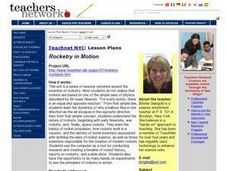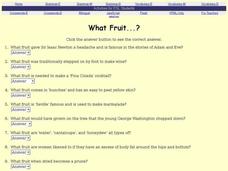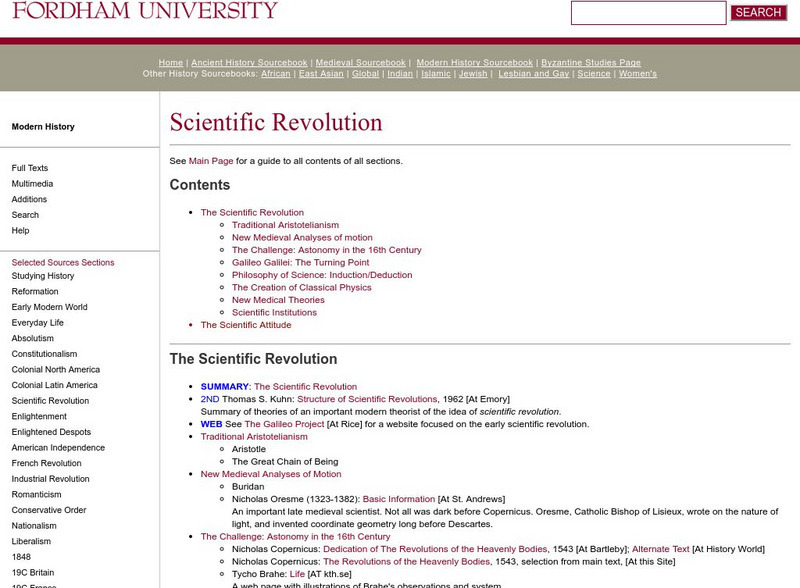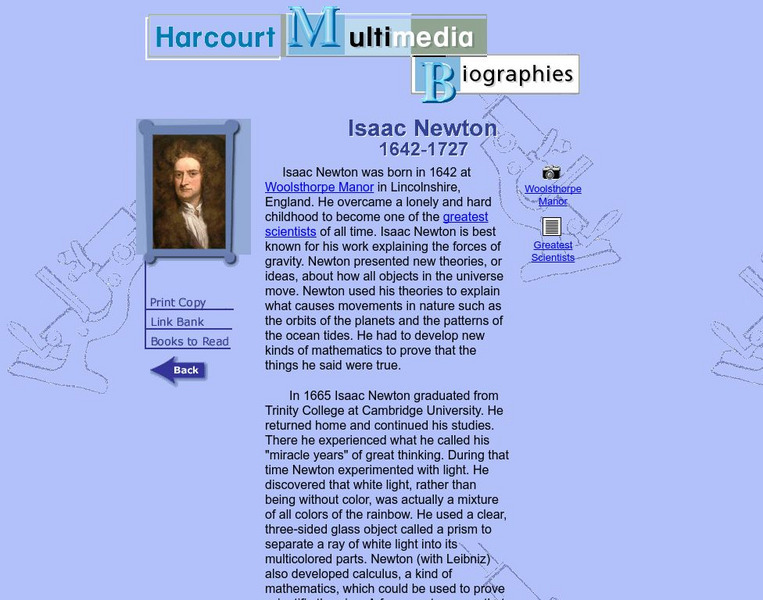Curated OER
Simple Machines/Technology
Third graders examine the concept of work as the movement of an object through a distance. They define gravity and determine what type of work is caused by gravity. They measure how far an object is moved by a force. They make a...
Curated OER
Scientists at Work: What'll they think of next?
Learners explore scientific discovery while watching a video. They, in groups, are to research a scientific invention and present their findings to the class.
Curated OER
Learning About the Shape of the Earth
Seventh graders investigate ways of telling the shape of the Earth and its position in the Universe both historically and today.
Curated OER
Objects as Self
Students examine how objects and setting help complete a self-portrait. They analyze Franklin's self-portraits before creating their own. They try to create the self-portrait as if they were in Franklin's time.
Curated OER
Rocketry in Motion
Students investigate why a balloon flies in one direction as air escapes in the opposite direction, which helps them understand the nature of rockets and fireworks. Individually and in teams, students conduct research to create a...
Curated OER
Interest Survey
In this science and social studies worksheet, students complete a survey about their interests. Students check each subject that they are interested in, such as killer whales, Thomas Edison, and magnets.
Curated OER
ESL: What Fruit?
In this ESL fruit vocabulary worksheet, students answer questions to determine what fruits are being described, clicking on an answer button for immediate feedback.
Curated OER
Where Will It Go?
Students predict the path of a ball bouncing off an object. In this physics activity, students conduct the rolling ball experiment to test their prediction. They perform several trials for accuracy.
Internet History Sourcebooks Project
Fordham University: Modern History Sourcebook: Letters on Newton
An interesting site from Fordham University that provides letters Voltaire wrote regarding Newton and his work.
University of St. Andrews (UK)
University of St. Andrews: Sir Isaac Newton Biography
This is an in-depth biographical account of the life of Sir Isaac Newton. Includes an image of his childhood home. Uses popups.
University of Virginia
Sir Isaac Newton Projectiles and Planets
A short account of Newton's life is provided (from birth to death) as is a somewhat detailed look at Newton's studies of gravity.
PBS
Pbs Learning Media: Newton's Triple Play: Baseball Science
In this lesson, middle schoolers watch a video and animations that relate Isaac Newton's three laws of motion to baseball and apply what they've learned about these laws to another sport or other real-life situation. It includes...
Science Struck
Science Struck: The Accomplishments of Isaac Newton
Read about the life of Isaac Newton and his many accomplishments in physics, mathematics, optics, and religious study, and how his discoveries helped in space research.
Internet History Sourcebooks Project
Fordham University: Modern History Sourcebook: Isaac Newton
This site from Fordham University links to excerpts of Newton's major works. Please scroll down to find the section on Newton titled "The Creation of Classical Physics." You will be able to actually read some of Newton's work! Read...
Khan Academy
Khan Academy: Isaac Newton
A biography of the scientist that developed the theory of gravity and founded the three basic laws of motion, Isaac Newton.
Houghton Mifflin Harcourt
Harcourt: Biographies: Isaac Newton
A brief biography on scientist Isaac Newton, highlighting his discoveries and the book he published in 1687, "Principia", which was on his theories of gravity and laws of motion.
Famous Scientists
Famous Scientists: Isaac Newton
Learn about one of the most well-known scientist, Isaac Newton, in this article. This article includes all the information about his life and accomplishments.
PBS
Pbs Learning Media: Newton's Triple Play: Baseball Science
In this lesson, students watch a video and animations that relate Isaac Newton's three laws of motion to baseball and apply what they've learned about these laws to another sport or other real-life situation.
Other
Isaac Newton
A page at the Isaac Newton (1642-1727 CE) Institute for the Mathematical Sciences website. This page, the contents of which come from the Microsoft Encarta encyclopedia, describes the upbringing, the education, the scientific and...
The History Cat
The History Cat: Isaac Newton
Profile of Isaac Newton, with a description of his scientific theories, the impact he had on the world of science in his day, and the influence his ideas still have in the world today.
Florida State University
Florida State University: Science, Optics & You: Sir Isaac Newton
Biography of Sir Isaac Newton (1642-1727), a scientist whose impact is felt in many disciplines today. His laws of motion are integral to basic physics, and he co-invented calculus.
American Museum of Natural History
American Museum of Natural History: Issac Newton O Logy Card
OLogy cards are like virtual baseball cards about all kinds of science topics. This one is about Sir Isaac Newton. See if you can answer a few questions when you're done reading.
Science Struck
Science Struck: Father of Calculus Newton or Leibniz?
Discusses the continuing debate over who was the founder of calculus, Sir Isaac Newton or Gottfried Wilhelm von Leibniz.
PBS
Pbs Learning Media: Newton's Third Law: Action Reaction
An early astronaut's experiences teach students that Newton's third law of motion-for every action, there is an equal and opposite reaction-applies both on Earth and in outer space.
Other popular searches
- Isaac Newton
- Sir Isaac Newton
- Isaac Newton Power Point
- Isaac Newton 2nd Law
- Isaac Newton and Gravity
- Isaac Newton Gravity
- Education of Isaac Newton
- Isaac Newton Research
- Isaac Newton Vocabulary
- Pics of Isaac Newton
- Pods of Isaac Newton
- Sir Isaac Newton Apples




